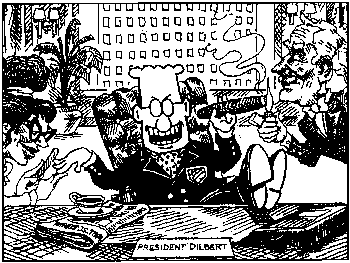
Laugh Now, Pay Later: Is Dilbert a hapless victim of globalization or a weapon in the war against workers? Norman Solomon explains it all for duped cubicle inmates.
Norman Solomon's new book exposes Scott Adams as a tool of the corporate elites
Marge: [Cautioningly] It's easy to criticize ...
Homer: Yeah! And fun, too!
The Simpsons
THE FUNNY PAGES' Dilbert and television's Homer Simpson seemingly have much in common. Both are cartoon characters stuck in dumb, unfulfilling jobs. Both are figures whose images are licensed everywhere from T-shirts to mousepads.
The two may share a television network soon, too. Development money has been spent to turn Dilbert into a sitcom for the Fox Network. If launched, the show will spread Scott Adams' office humor to new millions. The little character with the glasses and the fish-hook-shaped tie is realizing all of the merchandising goals ever dreamed of by cartoonist Adams, who has said, "I think of myself as a businessman first and an artist second."
The Trouble With Dilbert: How Corporate Culture Gets the Last Laugh by Norman Solomon ($9.95; Common Courage Press, Box 702, Monroe, ME 04951) is a media critic's analysis of the popular cartoon strip. It's also something of an homage to Ariel Dorfman's How to Read Donald Duck, an early study of the uses of cartoons as colonizing tools. In Solomon's view, Dilbert is a safety valve for discontent, easily approved of by the managerial class: "Many managers are happy to get on a Dilbert bandwagon that isn't going anywhere."
Dilbert mocks the "induhviduals" who keep a man from doing his job, but on the larger issues of corporate malfeasance, Adams is mute. The cartoonist is even an apologist for downsizing. In a May 1997 Canadian television interview, he opined, "Everyone knows someone who came out fine after getting downsized. ... Suddenly it's not such a scary thing anymore."
Dilbert's wistful grousing about badly run companies is, as Solomon suggests, a safety valve that doesn't release any real pressure. Just as stress-management classes instruct employees in rage-swallowing and chronic-pain-enduring, Dilbert counsels submitting to the inevitable.
CONTRAST THE DOZEN or so characters in Dilbert with the range of types, classes and attitudes on The Simpsons. There are so many by now that a new book, The Simpsons ($15.95; Harper Perennial), is necessary to chart the dozens of supporting characters. Everyone in Springfield does his or her little part to make the town a dump, but all are in the thrall of the corporate vulture Montgomery Burns.
Dilbert mocks the nameless middle-management guy with the Larry Fine haircut. By contrast, The Simpsons fingers the real power elite. Burns is the most extreme caricature of a plutocrat in the history of populism. He consorts with Dracula, acts like Dr. Frankenstein and befriends Satan ("Hmm, Smithers, who is that goat-legged fellow? I like the cut of his jib!"). Burns once even unveiled a scheme to blot out the sun for daring to compete with his nuclear power plant.
It may be stretching a point to discuss the social-realist qualities of Homer Simpson, a character who has flown in outer space and mud-wrestled with George Bush. Still, the apish Homer is smart enough to know that the source of troubles at the plant is also the main source of Springfield's problems.
In his book, Solomon quotes comedian Bob Harris' list of topics rarely or never mentioned in Dilbert. Almost all of them have turned up in The Simpsons: planned obsolescence, deregulation, work-related hazards, falling literacy rates, the poisoned environment (see the three-eyed fish jumping in the Springfield River), the export of jobs overseas, the warehousing of the aged--even if Abe Simpson deserves warehousing.
Springfield is a fantasy land in which middle-sized town life isn't just satirized, but torn to shreds; media, work, history and family life all end up in the mill. By contrast, Dilbert is more specific. If Adams hadn't been so much a part of the corporate world--with its euphemisms, overtime regimen, deadlines and monotony--he wouldn't be able to fillet it as well as he does. And Solomon can only castigate Adams for views the cartoonist is not hiding. Like any other entertainer, Adams is anxious to be an everyman, a hero to the downtrodden. So if depressed cubicle dwellers still get a forbidden thrill from Dilbert, it's because they're projecting their own longings as much as seeing what's really there on paper.
Considering the use of Dilbert in employee manuals for Intel, Xerox and Lockheed, This Modern World cartoonist Tom Tomorrow (who contributed the foreword to Solomon's book) has proposed the next step: a Dilbert@termination notice to take the sting out of a layoff.
The Simpsons' creator Matt Groening's own studies of the workplace can be seen in his early comics collected in Work Is Hell, which recorded the boredom and misery of clerical workers out of Adams' line of sight. In sum, Groening wanted revenge, and Adams wanted money, and that's made all the difference between them.
[ Metro | Metroactive Central | Archives ]
![[Metroactive Books]](/books/gifs/books468.gif)